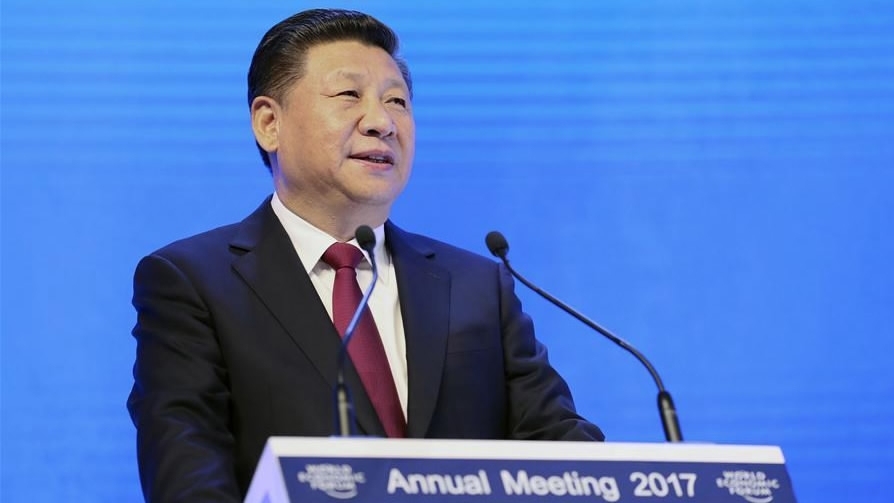World elites gathered in the snow-capped Swiss town of Davos on Wednesday, focusing on creating a shared future in a fractured world, a theme that reflects Chinese President Xi Jinping's vision of global governance.
Xi delivered a speech at the World Economic Forum (WEF) held in Davos last year, outlining his ideas to tackle major global challenges, against the backdrop of a rising anti-globalization sentiment and protectionism that have frustrated attempts to lessen the divides.
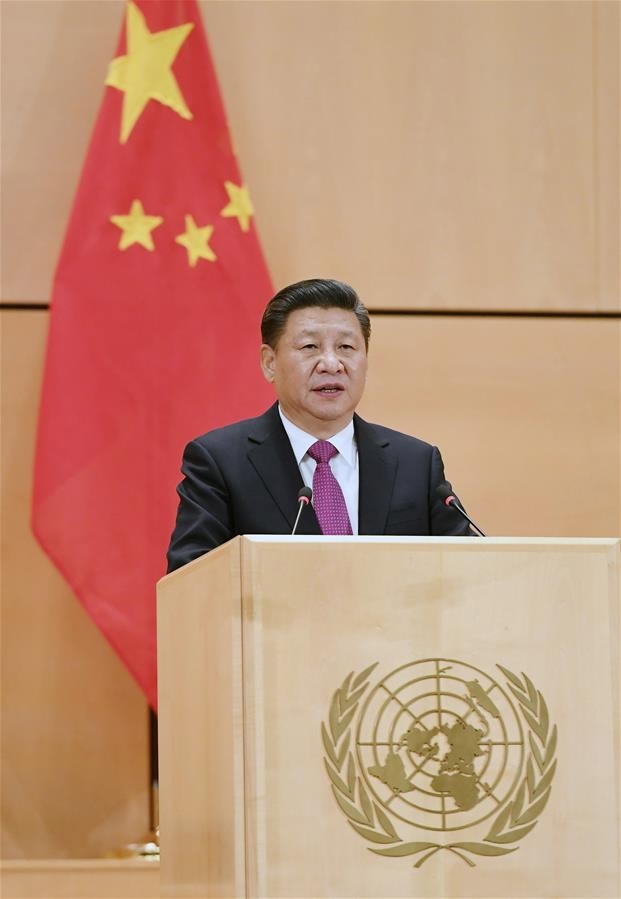
Chinese President Xi Jinping delivers a keynote speech at the United Nations Office in Geneva, Switzerland, on January 18, 2017. /Xinhua Photo
Chinese President Xi Jinping delivers a keynote speech at the United Nations Office in Geneva, Switzerland, on January 18, 2017. /Xinhua Photo
By building a community with a shared future for mankind and working together, Xi said, people's lives around the world could be improved, a view that still enlightens the participants at this year's meeting.
A common cause
"Today, mankind has become a close-knit community of shared future ... We should commit ourselves to growing an open global economy to share opportunities and interests through opening-up and achieve win-win outcomes," Xi said in his keynote speech at the annual Davos meeting on Jan. 17, 2017.
As geostrategic fissures have re-emerged on multiple fronts with wide-ranging political, economic and social consequences, China's understanding of common development provides solutions to these problems as it stresses equality, fairness and inclusiveness.
President Xi's speech was of historical significance, said Klaus Schwab, founder and chief executive of the WEF, adding that Xi highlighted the spirit of inclusiveness and coordination that impressed the participants.
"The Chinese leadership has been noted in fields such as climate change, the future of the Internet, as well as development of finance through 'One Belt One Road'. At the same time, we increasingly see China's globalizing enterprises playing a responsible role on the international stage, for example in the area of trade and circular economy," Schwab told Xinhua in a recent interview.
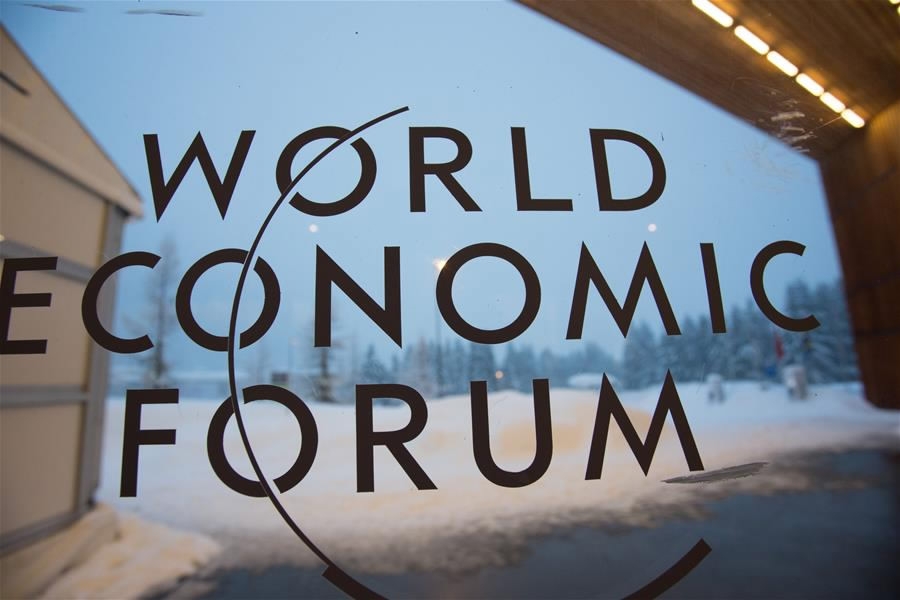
The logo of the World Economic Forum (WEF) in Davos, Switzerland. /Xinhua Photo
The logo of the World Economic Forum (WEF) in Davos, Switzerland. /Xinhua Photo
The Chinese president first brought up his idea of building a global community to the world in March 2013 during his visit to Moscow. In the following years, Xi refined his vision of global governance. His detailed elaboration of the concept in Davos last year has won him widespread praise at home and abroad.
In his report made at the 19th National Congress of the Communist Party of China last October, Xi repeatedly raised the concept of building a community with a shared future for mankind, laying out a road map for China's foreign policy that connects the country's future to that of the whole world, and leading many countries to follow suit.
"China will continue to play its part as a major and responsible country, take an active part in reforming and developing the global governance system, and keep contributing Chinese wisdom and strength to global governance," Xi said in his report.
A vision in action
In his speech made in Davos last year, Xi outlined a blueprint for common development, ranging from international relations, security and stability, to cultural exchanges and environmental protection, in a bid to join the world in building a community with a shared future.
China has taken concrete steps in this regard since then. In May, Beijing hosted dozens of world leaders at the first Belt and Road Forum for International Cooperation.
Proposed by Xi in 2013, the Belt and Road Initiative aims to achieve policy, infrastructure, trade, financial and people-to-people connectivity along and beyond the ancient Silk Road trade routes, thus building a new platform for international cooperation to create new drivers of growth.
So far, over 100 countries and international organizations have responded positively to the initiative and pledged their support. More than 80 countries and international organizations have signed cooperation agreements with China.
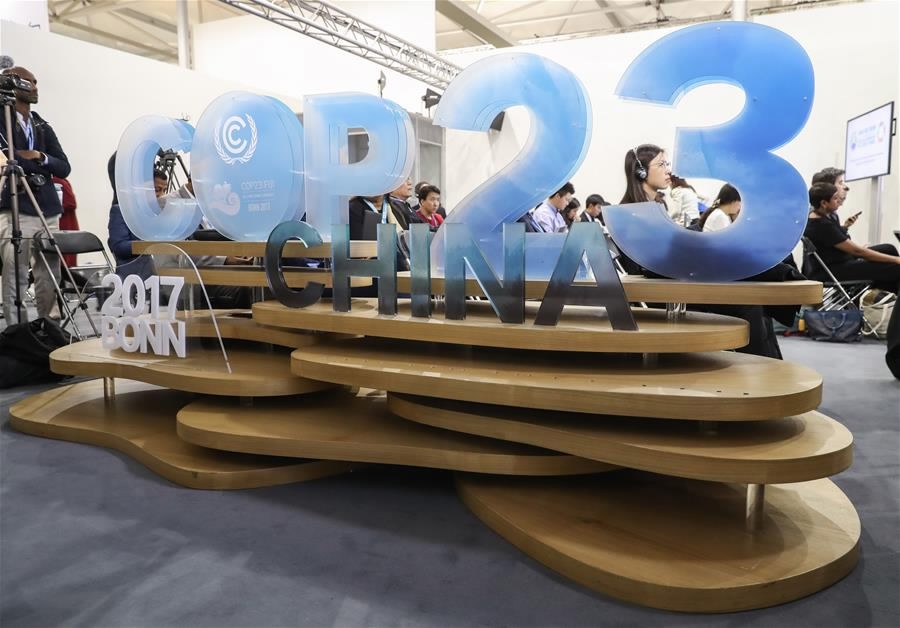
The pavilion of China in "Bonn Zone" of the UN climate talks in Bonn, Germany, on Nov. 15, 2017. /Xinhua Photo
The pavilion of China in "Bonn Zone" of the UN climate talks in Bonn, Germany, on Nov. 15, 2017. /Xinhua Photo
Based on the idea of building a community with a shared future for mankind, China actively developed global partnerships and expanded the convergence of interests with other countries.
China thus promotes cooperation and coordination with major countries, and meanwhile, strengthens relations with developing countries under the principles of amity, sincerity, mutual benefit and inclusiveness.
Within the framework of the Belt and Road Initiative, China has helped other countries in infrastructure construction across the globe.
In May, Kenyan President Uhuru Kenyatta launched the first passenger train service of the 480-km Mombasa-Nairobi Standard Gauge Railway built by Chinese companies, which was part of China's support for Africa's endeavor for industrialization, prosperity and regional integration.
Meanwhile, China has been a strong advocate for curbing the adversities of global warming. The International Energy Agency said in a report last year that as the world's top energy investor, China saw a 25-percent decline in coal-fired power investment in 2016 and is increasingly driven by clean electricity generation and networks, as well as energy efficiency investment. It expects China to overtake Europe within a few years in terms of energy-efficiency investment.
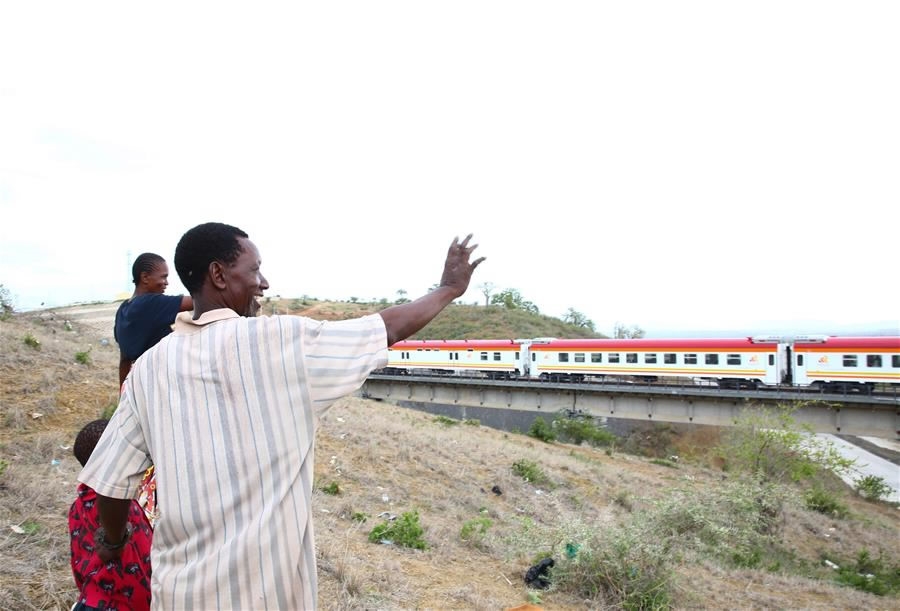
Kenyan villagers wave as a train runs on the Mombasa-Nairobi Standard Gauge Railway, in Mombasa, Kenya, April 29, 2017. /Xinhua Photo
Kenyan villagers wave as a train runs on the Mombasa-Nairobi Standard Gauge Railway, in Mombasa, Kenya, April 29, 2017. /Xinhua Photo
In his 2018 New Year speech, Xi said "China will conscientiously perform its due international obligations and responsibilities, keep its promises on global climate change, actively push forward the implementation of the Belt and Road Initiative, and always contribute to the building of world peace and global development, and safeguarding of international order."
An expanding consensus
Professor Sir Angus Deaton, a Nobel laureate, said he admires China's efforts to build a community of common destiny and that he appreciates China's contributions to the world and globalization.
Xi told the world in his speech that China supports globalization and urges other countries to make joint efforts, Deaton said.
Recognizing China's contributions and efforts, the United Nations (UN) Security Council adopted Xi's community concept for the first time in its resolution in March 2017.
The concept reflects the Chinese president's broad and humane vision for better global governance, and came at a time when world elites were seeking inspiration to tackle challenges and risks.
Michael Moller, director general of the UN Office in Geneva, told Xinhua that President Xi's concept of a community of common destiny for mankind is very impressive and "extremely welcome," particularly in today's world that is fragmented, confrontational and difficult.
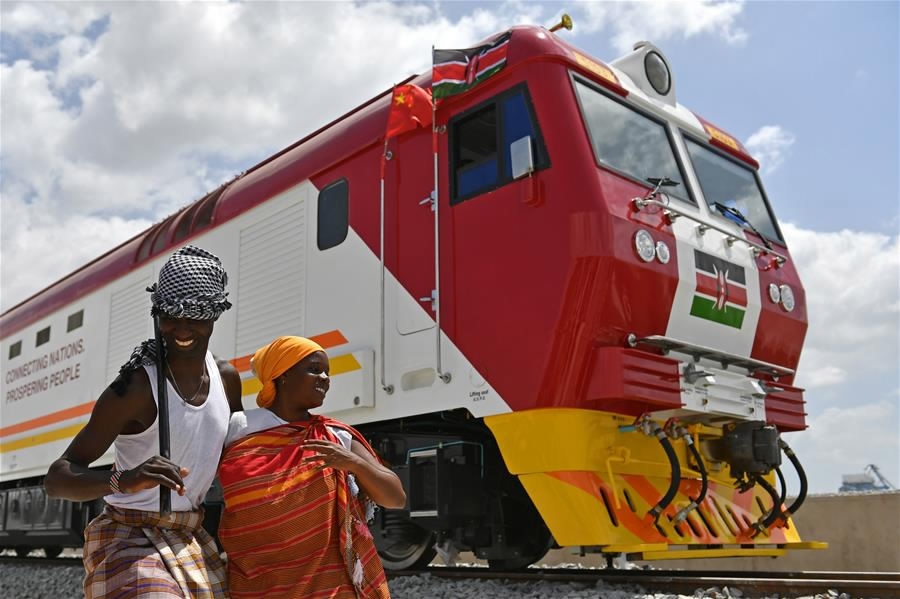
Kenyans sing and dance next to one of the first batches of locomotives made by Chinese companies for the Mombasa-Nairobi Standard Gauge Railway, in Mombasa, Kenya, on Jan. 11, 2017. /Xinhua Photo
Kenyans sing and dance next to one of the first batches of locomotives made by Chinese companies for the Mombasa-Nairobi Standard Gauge Railway, in Mombasa, Kenya, on Jan. 11, 2017. /Xinhua Photo
"The concept is very much in line with what the world needs today. It is very important for the international community to have this kind of much more collaborative approach to help solve the problems today but also the problems of tomorrow," he said. "We do need drivers, we need great countries like China to help us make our common goals happen."
Across the Atlantic Ocean, world leaders sided with Davos participants on Xi's vision.
Alicia Barcena, executive secretary of the UN Economic Commission for Latin America and the Caribbean, said Tuesday that the Latin American and the Caribbean countries are promoting the building of a community with a shared future for mankind, with the aim of creating a more peaceful and sustainable world.
"China is playing an important role in achieving common prosperity and lasting peace across the world," she said at the second ministerial meeting of the China-CELAC (Community of Latin American and Caribbean States) Forum.
(Top image: Chinese President Xi Jinping delivers a keynote speech at the opening plenary of the 2017 annual meeting of the World Economic Forum in Davos, Switzerland, Jan. 17, 2017. /Xinhua Photo)
Source(s): Xinhua News Agency

